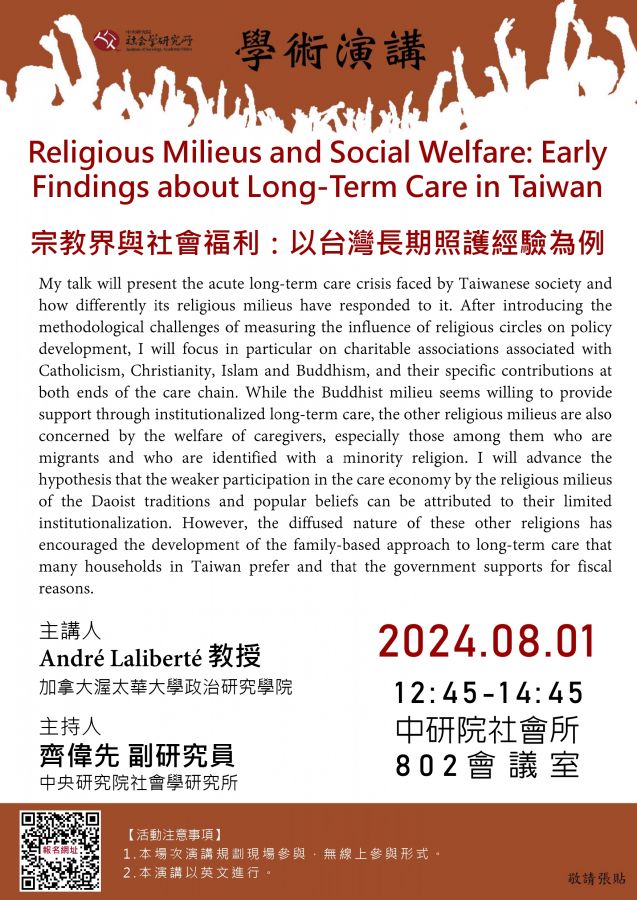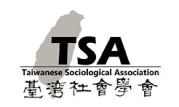中研院社會所8/1「宗教界與社會福利:以台灣長期照護經驗為例」演講
2024-07-17
中研院社會所「多元宗教與社會」主題研究小組將於8月舉辦一場學術演講,歡迎踴躍報名參加。
主題:宗教界與社會福利:以台灣長期照護經驗為例
講者:André Laliberté(加拿大渥太華大學政治研究學院教授)
主持:齊偉先(中央研究院社會學研究所副研究員)
時間:2024年8月1日(星期四)12:45-14:45
報名:https://forms.gle/83JjbPUzDWcq73337
地點:中央研究院社會學研究所802會議室(中研院人文館8樓)
【演講簡介】
本次演講將介紹台灣社會面臨的嚴重長期照護危機,以及宗教界對此有何不同的反應。講者在介紹了衡量宗教界對政策制定影響的方法論挑戰之後,將特別關注與天主教、基督教、伊斯蘭教和佛教相關的慈善協會,以及它們在關懷鏈兩端的具體貢獻。雖然佛教界似乎願意透過制度化的長期照護提供支持,但其他宗教界也關注家庭看護工的福利,特別是其中那些外來移民的宗教信仰者。講者將提出這樣的假設:道教傳統和民間信仰的宗教界對照護經濟的參與較為薄弱,可歸因於它們的制度化程度有限。然而,這些其他宗教的分散性質卻促進了以家庭為基礎的長期照護方式發展,台灣許多家庭寧可採取這種方式,而政府出於財政原因也支持這種方式。
【講者介紹】
André Laliberté是加拿大渥太華大學政治研究學院教授,自2008年起教授比較政治學、亞洲政治課程,特別是中國政治。在此之前,他曾在魁北克大學蒙特婁分校政治學系任職五年,而後在渥太華大學政治學系任職四年。2011年在美國華盛頓特區伍德羅.威爾遜中心(Woodrow Wilson Center)擔任訪問學者,並於2014年在英屬哥倫比亞大學亞洲研究所擔任客座教授。
Laliberté教授於1999年獲得加拿大英屬哥倫比亞大學政治學博士學位,論文是關於台灣佛教組織的政治行為;以及在同一所大學獲得碩士學位,論文題目是印度人民黨和印度在喀什米爾的政策。在這些研究中,對宗教與政治的結合深感興趣,日後將研究興趣擴展到身分、慈善事業,以及現今的權利與社會政策之間的結合。
Laliberté教授曾就中國和台灣的宗教與政治問題發表過文章。他在巴黎社會、宗教與自由主義小組(Groupe Sociétés, Religions, et Laïcités)和美國普渡大學中國社會宗教中心(Center for Religions in Chinese Societies)擔任過研究助理;以及由加拿大社會科學與人文研究學會(Social Sciences and Humanities Research Council, SSHRC)資助的種族和民主治理研究小組共同研究員,該組織主要核心關懷之一是關於中國和台灣的良善自由議題。
主題:宗教界與社會福利:以台灣長期照護經驗為例
講者:André Laliberté(加拿大渥太華大學政治研究學院教授)
主持:齊偉先(中央研究院社會學研究所副研究員)
時間:2024年8月1日(星期四)12:45-14:45
報名:https://forms.gle/83JjbPUzDWcq73337
地點:中央研究院社會學研究所802會議室(中研院人文館8樓)
活動聯絡:林先生,ming56@gate.sinica.edu.tw
【演講簡介】
本次演講將介紹台灣社會面臨的嚴重長期照護危機,以及宗教界對此有何不同的反應。講者在介紹了衡量宗教界對政策制定影響的方法論挑戰之後,將特別關注與天主教、基督教、伊斯蘭教和佛教相關的慈善協會,以及它們在關懷鏈兩端的具體貢獻。雖然佛教界似乎願意透過制度化的長期照護提供支持,但其他宗教界也關注家庭看護工的福利,特別是其中那些外來移民的宗教信仰者。講者將提出這樣的假設:道教傳統和民間信仰的宗教界對照護經濟的參與較為薄弱,可歸因於它們的制度化程度有限。然而,這些其他宗教的分散性質卻促進了以家庭為基礎的長期照護方式發展,台灣許多家庭寧可採取這種方式,而政府出於財政原因也支持這種方式。
【講者介紹】
André Laliberté是加拿大渥太華大學政治研究學院教授,自2008年起教授比較政治學、亞洲政治課程,特別是中國政治。在此之前,他曾在魁北克大學蒙特婁分校政治學系任職五年,而後在渥太華大學政治學系任職四年。2011年在美國華盛頓特區伍德羅.威爾遜中心(Woodrow Wilson Center)擔任訪問學者,並於2014年在英屬哥倫比亞大學亞洲研究所擔任客座教授。
Laliberté教授於1999年獲得加拿大英屬哥倫比亞大學政治學博士學位,論文是關於台灣佛教組織的政治行為;以及在同一所大學獲得碩士學位,論文題目是印度人民黨和印度在喀什米爾的政策。在這些研究中,對宗教與政治的結合深感興趣,日後將研究興趣擴展到身分、慈善事業,以及現今的權利與社會政策之間的結合。
Laliberté教授曾就中國和台灣的宗教與政治問題發表過文章。他在巴黎社會、宗教與自由主義小組(Groupe Sociétés, Religions, et Laïcités)和美國普渡大學中國社會宗教中心(Center for Religions in Chinese Societies)擔任過研究助理;以及由加拿大社會科學與人文研究學會(Social Sciences and Humanities Research Council, SSHRC)資助的種族和民主治理研究小組共同研究員,該組織主要核心關懷之一是關於中國和台灣的良善自由議題。
Laliberté教授在渥太華大學社會科學學院開設實地研究課程,課程聚焦於台灣(台北),包括舉辦專家講座、訪談參與促進護理人員公民權利的民間社會行動者,以及深度導覽歷史紀念館區、醫療保健機構和重要文化遺址等。學生在課程中能了解到,在傳統的性別關係發生變化的社會中,勞資關係和移民所受到的影響,以及對維護國家認同的深切關懷。
活動說明:
1. 本演講以英文進行。
2. 本活動僅開放現場演講,無規劃線上參與形式。
……………………………………..…………………………..…………………………..……………
Topic|Religious Milieus and Social Welfare: Early Findings about Long-Term Care in Taiwan
Speaker| Professor André Laliberté (School of Political Studies at the University of Ottawa)
Session Chair|Wei-Hsian Chi (Associate Research Fellow, Institute of Sociology, Academia Sinica)
Time|1 August 2024 12:45-14:45
Registration|https://forms.gle/83JjbPUzDWcq73337
Location|8F, Room 802, Institute of Sociology, South Wing, Humanities and Social Sciences Building, Academia Sinica
Brief|
My talk will present the acute long-term care crisis faced by Taiwanese society and how differently its religious milieus have responded to it. After introducing the methodological challenges of measuring the influence of religious circles on policy development, I will focus in particular on charitable associations associated with Catholicism, Christianity, Islam and Buddhism, and their specific contributions at both ends of the care chain. While the Buddhist milieu seems willing to provide support through institutionalized long-term care, the other religious milieus are also concerned by the welfare of caregivers, especially those among them who are migrants and who are identified with a minority religion. I will advance the hypothesis that the weaker participation in the care economy by the religious milieus of the Daoist traditions and popular beliefs can be attributed to their limited institutionalization. However, the diffused nature of these other religions has encouraged the development of the family-based approach to long-term care that many households in Taiwan prefer and that the government supports for fiscal reasons
Speaker|
Professor Laliberté is professor in the School of Political Studies at the University of Ottawa, where he teaches comparative politics, the politics of Asia in general, and China in particular, since 2008. Prior to this, he spent five years at the Department of Political Science at UQAM and four years at the Department of Political Science at the University of Ottawa. He was a visiting scholar at the Woodrow Wilson Center, in Washington, DC, in 2011, and a visiting professor at the Institute of Asia Research of UBC, in 2014.
He has received his PhD in political science from UBC in 1999, for a thesis on the political behaviour of Buddhist organizations in Taiwan; and his MA degree from the same institution for a thesis on the BJP and the policy of India in Kashmir. In these works, he was interested in the intersection between religion and politics, and over the years, expanded his research interest to the issues of identity, philanthropy, and now the intersection between rights and social policies.
Prof. Laliberté has published on the issue of religion and politics in China and Taiwan. He has presented his work as a research associate of the Groupe Sociétés, Religions, et Laïcités in Paris and the Center for Religions in Chinese Societies, in Purdue University; as well as a co-investigator in a research team funded by the SSHRC on ethnicity and democratic governance; many of them on the issue of freedom of conscience in China and Taiwan.
Professor Laliberté teaches one of the Field Research Courses offered by the Faculty of Social Sciences at the University of Ottawa. Focused on Taiwan (Taipei), the classes include lectures by experts, meetings with civil society actors involved in the promotion of care workers’ civil rights, and excursions in the capital’s historical memorials, its health care institutions, and its important cultural sites. Students will gain understanding of the stakes related to labor relations and immigration in a society where traditional gender relations change, and concerns over the upholding of national identity remain acute.
Note:
1. This event will be conducted in English.
2. Online participation is not available.

活動說明:
1. 本演講以英文進行。
2. 本活動僅開放現場演講,無規劃線上參與形式。
……………………………………..…………………………..…………………………..……………
Topic|Religious Milieus and Social Welfare: Early Findings about Long-Term Care in Taiwan
Speaker| Professor André Laliberté (School of Political Studies at the University of Ottawa)
Session Chair|Wei-Hsian Chi (Associate Research Fellow, Institute of Sociology, Academia Sinica)
Time|1 August 2024 12:45-14:45
Registration|https://forms.gle/83JjbPUzDWcq73337
Location|8F, Room 802, Institute of Sociology, South Wing, Humanities and Social Sciences Building, Academia Sinica
Brief|
My talk will present the acute long-term care crisis faced by Taiwanese society and how differently its religious milieus have responded to it. After introducing the methodological challenges of measuring the influence of religious circles on policy development, I will focus in particular on charitable associations associated with Catholicism, Christianity, Islam and Buddhism, and their specific contributions at both ends of the care chain. While the Buddhist milieu seems willing to provide support through institutionalized long-term care, the other religious milieus are also concerned by the welfare of caregivers, especially those among them who are migrants and who are identified with a minority religion. I will advance the hypothesis that the weaker participation in the care economy by the religious milieus of the Daoist traditions and popular beliefs can be attributed to their limited institutionalization. However, the diffused nature of these other religions has encouraged the development of the family-based approach to long-term care that many households in Taiwan prefer and that the government supports for fiscal reasons
Speaker|
Professor Laliberté is professor in the School of Political Studies at the University of Ottawa, where he teaches comparative politics, the politics of Asia in general, and China in particular, since 2008. Prior to this, he spent five years at the Department of Political Science at UQAM and four years at the Department of Political Science at the University of Ottawa. He was a visiting scholar at the Woodrow Wilson Center, in Washington, DC, in 2011, and a visiting professor at the Institute of Asia Research of UBC, in 2014.
He has received his PhD in political science from UBC in 1999, for a thesis on the political behaviour of Buddhist organizations in Taiwan; and his MA degree from the same institution for a thesis on the BJP and the policy of India in Kashmir. In these works, he was interested in the intersection between religion and politics, and over the years, expanded his research interest to the issues of identity, philanthropy, and now the intersection between rights and social policies.
Prof. Laliberté has published on the issue of religion and politics in China and Taiwan. He has presented his work as a research associate of the Groupe Sociétés, Religions, et Laïcités in Paris and the Center for Religions in Chinese Societies, in Purdue University; as well as a co-investigator in a research team funded by the SSHRC on ethnicity and democratic governance; many of them on the issue of freedom of conscience in China and Taiwan.
Professor Laliberté teaches one of the Field Research Courses offered by the Faculty of Social Sciences at the University of Ottawa. Focused on Taiwan (Taipei), the classes include lectures by experts, meetings with civil society actors involved in the promotion of care workers’ civil rights, and excursions in the capital’s historical memorials, its health care institutions, and its important cultural sites. Students will gain understanding of the stakes related to labor relations and immigration in a society where traditional gender relations change, and concerns over the upholding of national identity remain acute.
Note:
1. This event will be conducted in English.
2. Online participation is not available.




